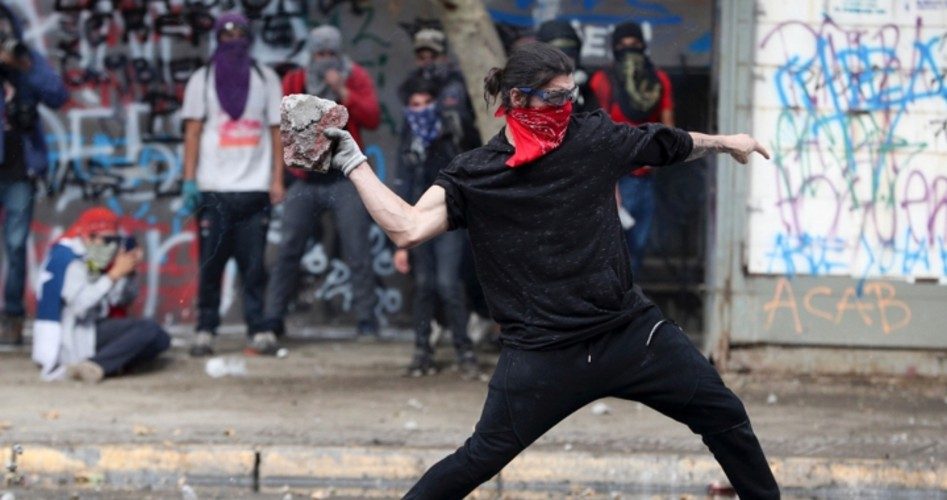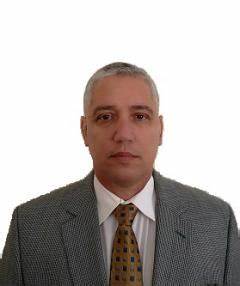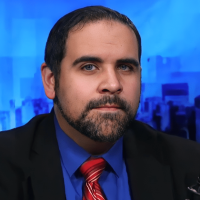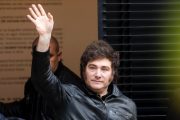
A former Cuban intelligence officer affirms that Cuba’s intelligence service is carrying out destabilization efforts in Chile and that they are being directed out of the Cuban embassy in Santiago.
For 11 years, Enrique García Diaz served as an officer in the General Intelligence Directorate (DGI) — Cuba’s primary intelligence agency under the supervision of Cuba’s Ministry of Interior. During his years of active duty, García Diaz served as a vice consul in Bolivia and as a foreign trade representative in Ecuador. At the same time, however, he was actually an undercover agent for the DGI, in charge of surveillance operations in seven Latin American countries, including Chile.
García Diaz defected to Ecuador in 1989 and now lives in the United States. In an interview with the Chile-based, Spanish-language, online news publication El Líbero, he claims that the DGI (since renamed the Directorate of Intelligence, DI) retains much of the experience and training that it received from two KGB-run institutes located in the outskirts of Moscow. According to García Diaz, these KGB-run academies conducted training for Cuban intelligence in 1981-82 and another one for the chiefs of Cuban intelligence in 1985-86.
Throughout the Cold War, the leadership of the Soviet Union steadfastly encouraged and supported Marxist revolutions in non-communist countries. By the mid-1960s, the Soviet Union, through its espionage and intelligence service the KGB (now renamed FSB), had established special training centers for fomenting revolution at the Lenin Institute and Patrice Lumumba University, both in Moscow. The KGB also set up additional centers throughout Eastern Europe, the Baltic, North Korea, and in Cuba.
At these centers, recruits from all over the world received special training in how to disseminate propaganda, handle small arms, make improvised explosives, and carry out asymmetrical warfare. Historically, under the direction of the Soviet Union, Cuba has played an instrumental role in inciting communist revolutions throughout Latin America.
In 1966, more than 500 representatives from various national liberation movements, so-called “non-aligned” governments, and other terrorist groups from some 80-plus countries gathered in Havana, Cuba, for the Solidarity Conference of the Peoples of Africa, Asia and Latin America, better known as the Tricontinental Conference. The purpose of this conference was to coordinate long-range strategies for inciting revolutions and civil wars in non-communist countries in order to draw those countries away from the West and toward the adoption of policies or new governments favorable to the communists and the Soviet Union.
The conference was coordinated and run by the DGI. Out of it was established the Organization of Solidarity with the Peoples of Asia, Africa and Latin America (OSPAAAL), which played a key role influencing the policy of the “Non-Aligned Movement” — countries that ostensibly appeared as neutral during the Cold War, but in reality aided the Soviet Union by refusing to cooperate with the West in exposing or opposing communist advancements. Today, OSPAAAL claims that its objectives are in fighting against neoliberalism (by which they mean free-market capitalism, such as deregulation and privatization of previously government-run services or industries) and in combating alleged human rights violations in non-communist countries (while ignoring much worse and actual systematic human rights abuses in countries with communist and socialist governments).
OSPAAAL, as well as the Communist Party of Chile, backed the Socialist Party government of Chilean President Salvadore Allende (1970-1973), before he was toppled by the country’s military led by Commander-in-Chief of the Chilian Army General Augusto Pinochet. In recent years, OSPAAAL has also strongly supported Hugo Chavez, Nicolás Maduro, and the United Socialist Party of Venezuela, all of which have also enjoyed the official backing of the Communist Party of Venezuela. OSPAAAL’s support for socialist and communist regimes can be found in the pages of their quarterly magazine Tricontinental, published in Havana, Cuba.
Through its patchwork network of subversive organizations, publications, and undercover agents, the DGI/DI plays a fundamental role in instigating revolution and other widespread unrest in non-communist countries. For decades, Chile has stood as a model for economic stability and prosperity, unmatched by any other country in Latin America. Now violent civil unrest, lootings, arsons, and clashes with the country’s police and military risk eviscerating all of those gains. They also risk plunging the country into anarchy and a possible new communist dictatorship along the lines of Castro’s Cuba or the Cuban-backed Chavez and Maduro regimes in Venezuela. According to García Diaz, Cuban intelligence has its hands in the fray.
“The activity of Cuban intelligence has as its main objective the penetration with secret agents and trust relationships of all government institutions, security organs, armed forces, political parties, media, universities, indigenous organizations, unions, etc., with the objective of influencing events, destabilizing Chilean democracy and imposing the geopolitical interests of Cuba in the country and region,” García Diaz told El Líbero.
 García Diaz assured El Líbero that the individual currently heading destabilization efforts in Chile is Warnel Lores Mora (left), the minister counselor of the Cuban embassy in Chile. El Líbero reports that according to the Chilean Consular Services, Lores Mora “arrived in the country on April 16, 2018, that is, one month after President Sebastián Piñera assumed his second [non-consecutive] term.” Piñera is Chile’s first outright conservative to win a presidential election since Jorge Alessandri won in 1958.
García Diaz assured El Líbero that the individual currently heading destabilization efforts in Chile is Warnel Lores Mora (left), the minister counselor of the Cuban embassy in Chile. El Líbero reports that according to the Chilean Consular Services, Lores Mora “arrived in the country on April 16, 2018, that is, one month after President Sebastián Piñera assumed his second [non-consecutive] term.” Piñera is Chile’s first outright conservative to win a presidential election since Jorge Alessandri won in 1958.
According to information provided by García Diaz to El Líbero, “Lores Mora was born on March 30, 1966 in Cuba. He studied at the vocational pre-university Vladimir Ilich Lenin in the city of Havana between 1978 and 1984; He joined the Union of Young Communists in 1980 and studied at the ISRI (Higher Institute of International Relations Raúl Roa García Diaz) between 1984 and 1989.”
According to García Diaz, it was during Lores Mora’s last year of university that he was selected to enter the DGI/DI. “In April 2018 he began his duties as Minister Counselor of the Cuban embassy in Chile, a diplomatic position that masks, as a facade, of his true role as head of the center of Cuban intelligence in Chile,” García Diaz said. He further added that Lores Mora’s “appointment as head of the center is a promotion in his career as an intelligence officer.”
On April 23, 2017, Lores Mora and the then-Cuban Ambassador to Chile Adolfo Curbelo Castellanos, along with representatives from Venezuela, Nicaragua, El Salvador, and Vietnam, attended a mass celebration of the legalization of the Communist Party of Chile, held at the Caupolicán Theater in Santiago. The celebration was also attended by members of Juventudes Comunistas de Chile (Spanish for Communist Youth of Chile), the party’s youth arm.
According to García Diaz, “Part of Cuba’s work is that it takes all these young communists, leaders of indigenous organizations, [and] union leaders to Cuba for political courses where they are taught Marxism-Leninism, class struggle, etc., etc.”
“That is the indoctrination work that Cuba does, which is very dangerous, but it is public. On the other hand, there is also the clandestine activity,” García Diaz further explained. García Diaz also identified Lores Mora as “the one who directs the penetration work to all the institutions of the country, he is the one who directs the entire secret network of Cuban agents in Chile, and it is he who has the responsibility of politically influencing the positions of Chile in favor of the interests of Cuba.” And according to García Diaz, it is the center for Cuban intelligence in Chile that is behind the current protests in Chile to destabilize the country and replace the government with one favorable to Havana and Caracas.
Among the primary objectives that both the current protests and the Communist Party of Chile have openly called for is a constituent assembly — a constitutional convention to replace the country’s current constitution, which was drafted in 1980 under the Pinochet government, with an entirely new socialist constitution.
Last week, violent demonstrations spread to the wealthiest neighborhoods of Santiago, threatening to loot and destroy Costanera Center, South America’s largest shopping mall and a complex that includes the Gran Torre Santiago (Great Santiago Tower) — the tallest skyscraper in South America. One American living in Santiago told The New American that she observed the protesting in front of Costanera Center, where she says demonstrators were shouting profanities at police and threatening to destroy the complex. She approached a demonstrator she identified as the loudest person in the crowd to ask him what the demonstrators hoped to achieve by burning and looting their own city and shopping complex. The protester she engaged eventually justified the mob’s actions as being a “revolution.”
This all comes on the 102nd anniversary of the October Revolution of 1917 (November 1917, based on our calendar), when Vladimir Lenin and his fellow Bolsheviks (Russian communists) and socialists overthrew Russia’s then-provisional government as part of the broader communist revolution that culminated in the formal establishment of the Union of Soviet Socialist Republics (USSR) in 1922. However, so long as Cuba continues its foreign espionage and destabilization operations, the Cold War and the twilight struggle against communism is far from over in Latin America.
Photo: AP Images
Related articles:




